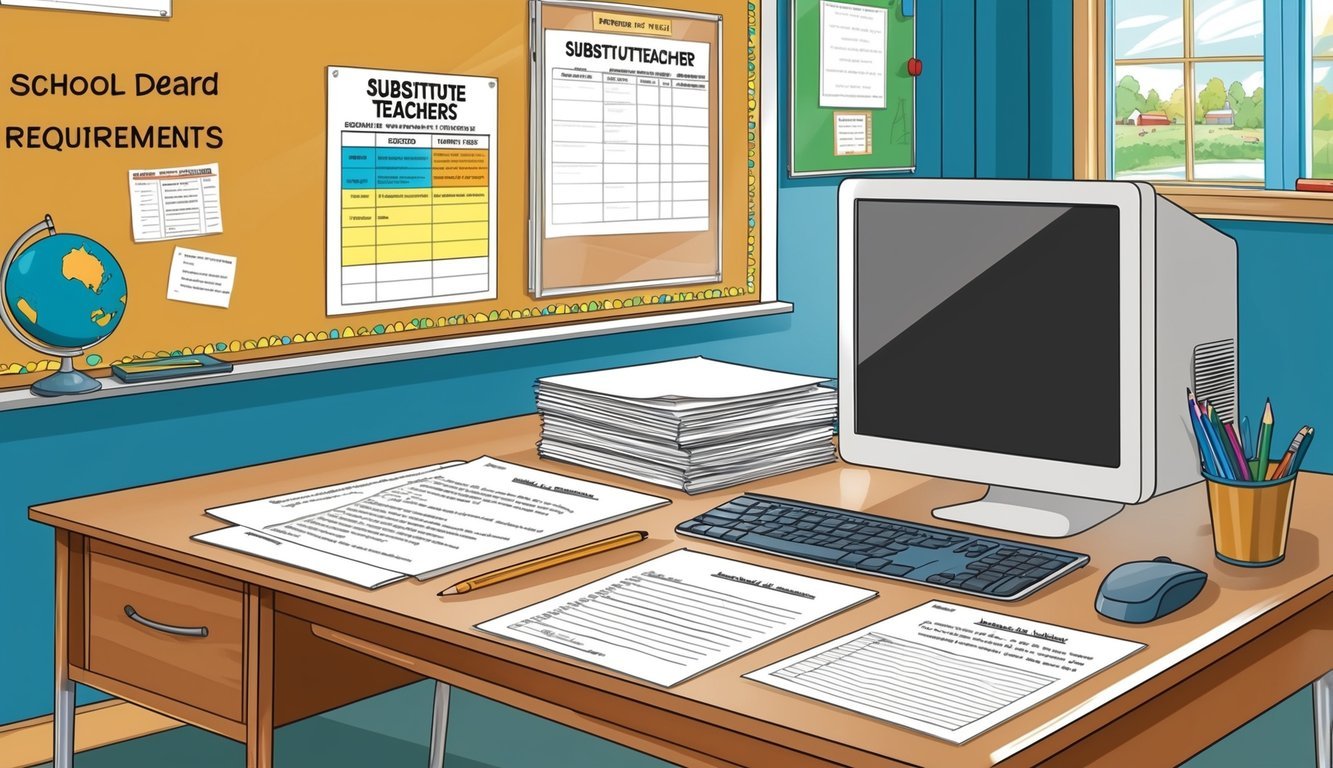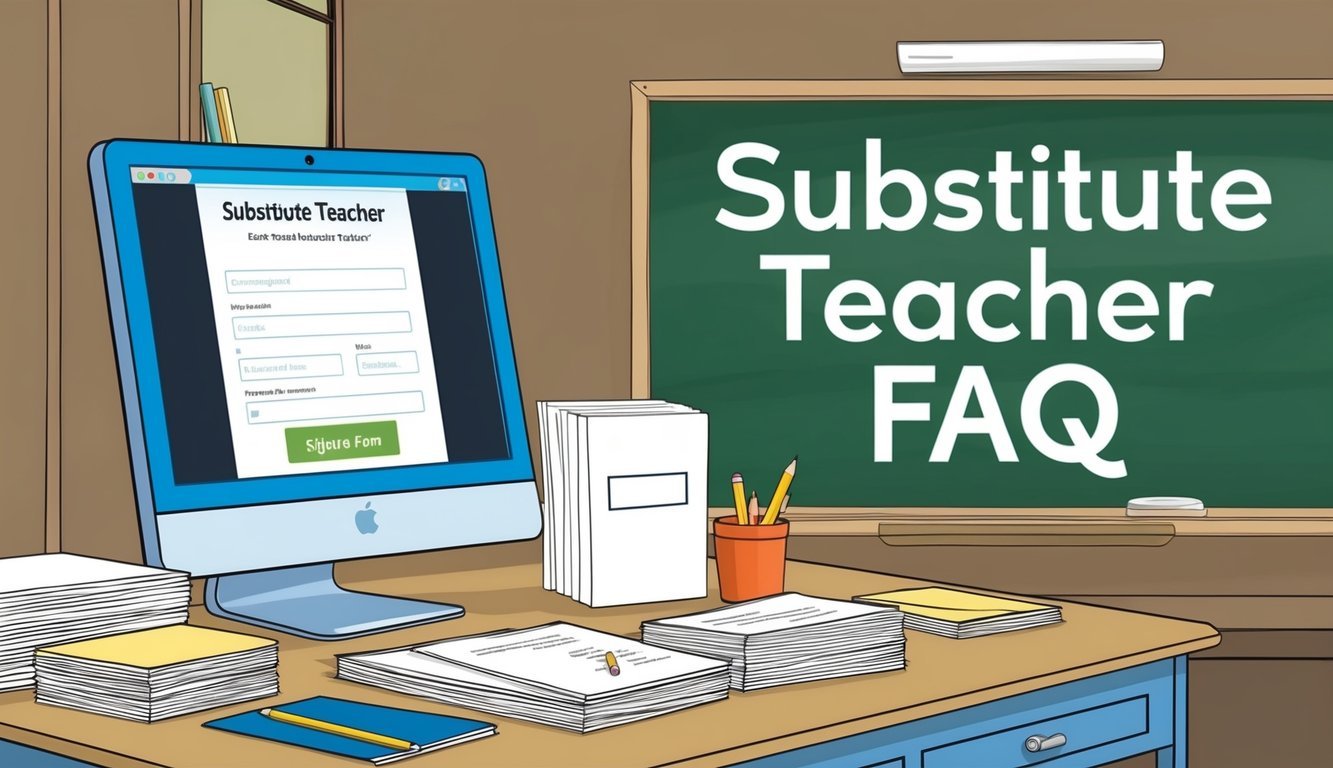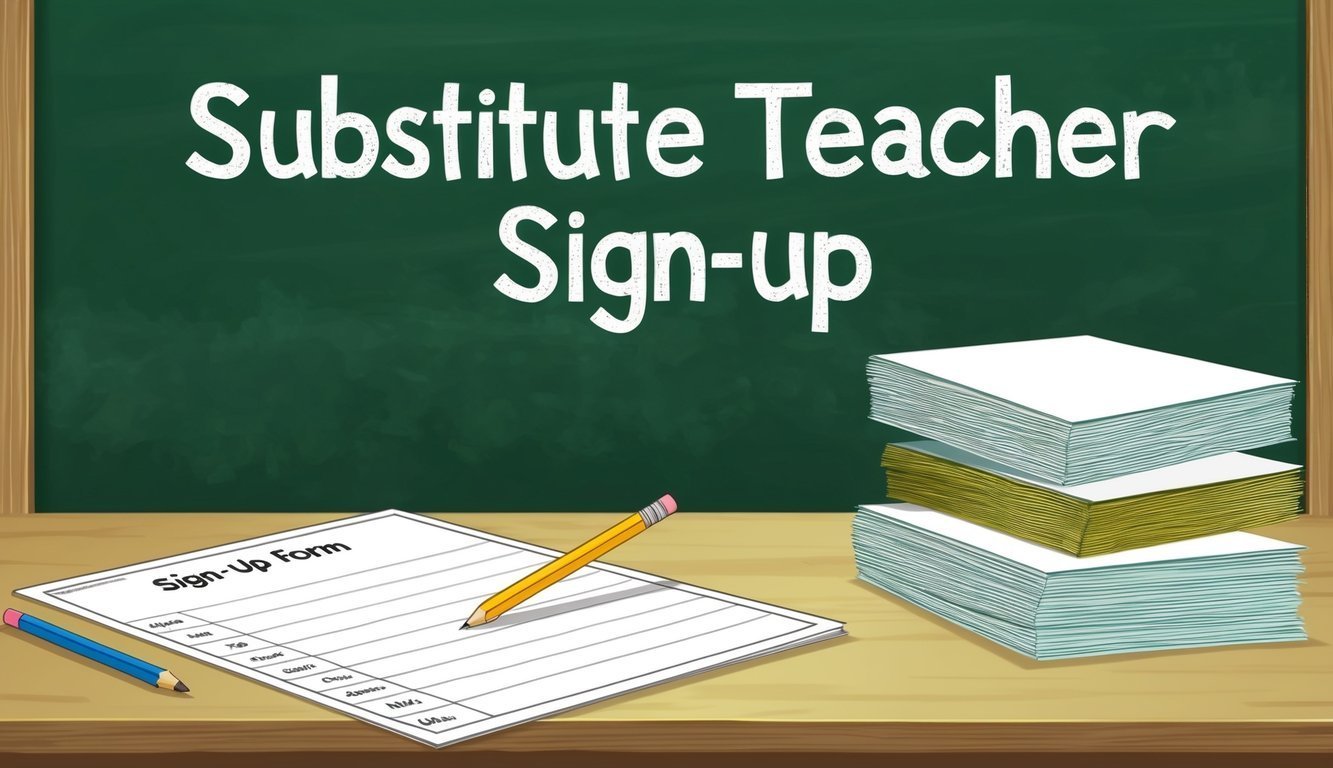Ever thought about becoming a substitute teacher? It’s a fantastic opportunity to impact students’ lives while gaining some real classroom experience.
Plus, getting started might be easier than you think.
To jump in as a substitute teacher, you’ll need to meet your state’s requirements.
Generally, a bachelor’s degree is a must, along with passing a background check. Some states throw in the requirement of having a teaching license or some certification too.
Once you tick those boxes, just reach out directly to local school districts to apply.
But hey, being a substitute can be a real mixed bag.
Sure, it can be challenging—think quick decisions and managing a classroom on the fly.
But on the flip side, you have the chance to inspire students and keep their education flowing when their regular teacher is off.
Key Takeaways
- You’ll need a bachelor’s degree and a background check to substitute teach.
- Apply directly to school districts for the best shot.
- Flexibility and classroom management skills? Absolute must-haves!
Understanding Substitute Teacher Requirements

Becoming a substitute teacher isn’t just a whim; it involves meeting some specific criteria that states and school districts set.
They’re designed to ensure subs are ready to teach and prioritize student safety.
Educational Background
Most states want you to have at least a little college education under your belt.
Some require a bachelor’s degree, but others may be okay with an associate degree or just a set number of college credits.
For instance, Illinois says you need 60 credit hours, while New Jersey demands a full bachelor’s. In some cases—like rural areas—you might even find opportunities with just a high school diploma.
Talk about flexibility!
But skills? They matter too! Great subs are ones who can:
- Explain things clearly
- Manage a classroom like a pro
- Be flexible (think of a rubber band!)
- Quickly think on their feet
Certification and Clearances
Safety isn’t taken lightly in schools.
That’s why substitutes usually have to pass a background check.
It’s all about keeping kids safe, right?
Some states also want you to have a specific license or permit.
Requirements might include:
- A skills test
- Safety training
- First aid certification
These steps help ensure subs are prepared for anything that might come their way, plus they show that you’re serious about the role.
State-Specific Guidelines
When it comes to substitute teaching, the rules can vary quite a bit depending on your state.
Here’s a quick summary of some regulations:
- California: Requires a bachelor’s degree and a Basic Skills Test.
- Texas: Asks for 60 college credits or more.
- New York: Wants subs to have a teaching certificate for long-term gigs.
- Ohio: Has different rules depending on how long the sub job is.
Always a good idea to check with your local school district too.
They may have extra requirements, and sometimes, they offer training sessions to help new subs feel more at home in the classroom.
Building Essential Skills for Substitute Teaching
Substitute teachers need a toolkit filled with skills to thrive in diverse classrooms.
These include keeping students engaged, being adaptable, communicating effectively, and managing time wisely.
Classroom Management Techniques
Effective classroom management is a cornerstone of substitute teaching.
It’s important to lay down clear rules and expectations right from the start.
Positive reinforcement? That’s your best buddy in promoting good behavior.
Here are some handy strategies:
- Learn students’ names quickly—it helps build rapport!
- Use nonverbal cues to redirect any less-than-ideal behavior.
- Have a few quick, fun activities ready for those transition moments.
Staying calm and consistent with classroom disruptions is essential.
You don’t want to get into a power struggle; instead, keep your focus on guiding the class back on track.
Developing Flexibility and Adaptability
Every day as a substitute is a little different, and being flexible is key.
You might find yourself teaching anything from math to history, and adaptability helps you fit into varied school cultures and teaching styles.
Here are a few tips for honing your adaptability:
- Quickly skim lesson plans.
- Be ready to tweak activities as needed.
- Stay open to new teaching methods; they can be a game-changer!
It’s also a great idea to prepare backup lessons for those unexpected twists.
Trust me, the more classrooms you enter, the easier this gets.
Enhancing Communication and Organization
Clear communication is a huge part of the job.
You’ll need to explain tasks, give directions, and collaborate with school staff smoothly.
Staying organized? That makes everything run like a well-oiled machine.
Want to amp up these skills? Try:
- Practicing clear and concise instructions.
- Using visual aids whenever possible; they can work wonders.
- Keeping your materials and schedules well-organized.
And don’t forget about tech skills! Many schools use digital tools for attendance and assignments, so being comfortable with basic tech can be super helpful.
Time Management Fundamentals
Managing your time effectively is crucial.
With so much to juggle in a limited timeframe, it’s vital to balance instruction, activities, and transitions seamlessly.
Here are some time management tips:
- Review class schedules and materials before you step in.
- Timer for activities? Yes, please!
- Always plan some buffer time between tasks.
Be prepared to adjust pacing because, let’s be real: some activities may take longer than expected.
Thinking on your feet is your best friend here!
Frequently Asked Questions

Thinking about becoming a substitute teacher? You’ll have to meet certain qualifications and complete some training; the application process can differ from district to district, too.
Plus, pay rates? They change based on where you are.
Here are some common questions about subbing in Georgia schools.
What qualifications do I need to become a substitute teacher in Georgia?
In Georgia, all you really need is a high school diploma or GED at the bare minimum.
Some districts even prefer candidates with a bachelor’s degree.
You’ll have to pass a background check and be at least 18 years old to dive in.
Can I obtain a substitute teacher certification online in Georgia?
While Georgia doesn’t require a specific certification for substitute teachers, many districts offer online training programs.
These generally cover classroom management and school policies, giving you a solid footing.
What’s the application process for a substitute teacher in Gwinnett County?
Gwinnett County Public Schools has a handy online application system for subs.
Just fill out your personal info, work history, and references, and be ready for a background check and orientation.
Are there any specific training programs for substitute teachers in GCPS?
GCPS offers training for new substitutes! This usually includes district policies, classroom management techniques, and safety procedures, often in a mix of online modules and in-person sessions.
How cool is that?
What are the general requirements to be eligible as a sub in schools?
Usually, most schools want subs to be at least 18 years old and have that high school diploma.
Passing a background check is key as well.
Solid communication skills and a positive attitude are super important too! Some districts might also require a brief training or orientation before you get started, and understanding classroom management techniques can make your life a whole lot easier.
If you’re curious about other career paths, you might even be looking into how to sign up for police academy!
How much can I expect to earn as a substitute teacher in various districts?
Pay rates can really vary from one district to another, and depending on your education level, too.
In Georgia, daily rates typically range from about $75 to $120.
And guess what? Some districts even offer higher pay for long-term gigs or if you’ve got a teaching certificate.

